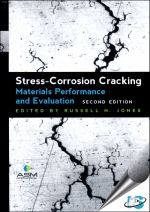Tab Article
This new second edition serves as a go-to reference on the complex subject of stress corrosion cracking (SCC), offering information to help metallurgists, materials scientists, and designers determine whether SCC will be an issue for their design or application; and for the failure analyst to help determine if SCC played a role in a failure under investigation.
Research conducted over the last 20 years warranted new coverage on crack tip chemistry analysis and modeling, SCC of low strength steels in alcohol, SCC in new high-strength steels, new data in SCC of stainless steels and nickel-base alloys, SCC of copper alloys in potable water, and hydrogen induced cracking of aluminum alloys. Additional case studies and a section on high-strength, low-alloy steels were added. An appendix of relevant standards pertaining to SCC is also included.
The book details the many conditions under which SCC can occur, the parameters which control SCC, and methodologies for mitigating and testing for SCC, plus information on the mechanism of SCC with experimental data on a variety of materials. It contains information about the environmental, mechanical, microstructural and chemical aspects of SCC to help predict and prevent component failure.
Materials covered in the chapters of this book include: carbon and low-alloy steels; high-strength steels; stainless steels; nickel-base alloys; copper alloys; aluminum alloys; magnesium alloys; titanium alloys; zirconium alloys; uranium alloys; amorphous alloys; and glasses and ceramics.


